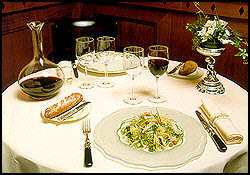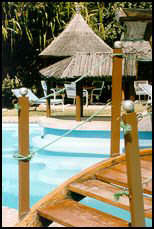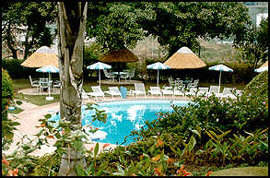
What are the main developments of Le Meridien regarding its situation in Malawi and the procedure involved in its arrival?
Le Meriden have entered into a contract with Sunbird Tourism at the end of last year which allows us to take over management of the eight properties of their hotel group in Malawi from January 1st, 2000 for a period of six years.
Why was Le Meridien chosen and what will be the impact here in Malawi?
A. Le Meridien is the upscale division of the Forte Group in the UK. It has a strong presence in west and northern Africa, but until now it has not had a presence in central and eastern Africa. So it is a first for us – a strategic move.
The reason for selecting Le Meridien, apart from the financial considerations of the contract, was the sales and marketing strength of Le Meridien, particularly for certain key markets which the owners are looking to exploit for the long-term expansion of in-bound tourism and commercial business. Our main markets are in the UK, mainland Europe, eastern Europe and North America. So this was the driving force, along with the recognition and quality of an international brand name like Le Meridien.
You will now have a leading position in Malawi, and it puts the hotel industry on the map for this country. What difference will this make as far as attracting greater numbers of tourists and developing the industry as a whole?
We have to say, first of all, that Protea has performed well in the past. They are a regional company and that was part of the reason why the owners changed direction and went with an international brand. They have done a good job in the past three years by putting the hotels in order and building up the industry.
Le Meridien can deliver a higher profile of hotels here through its sales and marketing network, and through its brand image and marketing. It is an association of quality and good management on an international scale.
The first two hotels to be developed are the Mount Soche and the Capital, are they not?
Yes, the Mount Soche and the Capital are the first two to be branded, principally because they are the two major hotels in terms of size. Financially they are also the most important, and success with these hotels will help drive changes and developments of the other hotels.
So these two hotels – the Mount Soche in Blantyre and the Capital in Lilongwe – will be branded as Le Merdien hotels this year, and the intention is to continue by branding three more properties in 2001. During the first half of 2001 we will be aiming to re-brand the Kuchawe Inn to become Le Meridien Kuchawe in Zomba, and the Livingstonia Beach Hotel in Singa Bay near Salima-on-the-Lake will become Le Meridien Livingstonia Beach Hotel. During the second half of the year the Lilongwe Hotel will be added to the stable as well.
There are three more properties in the group, a total of eight altogether, and the three remaining properties will be managed by Le Meridien management team in Malawi, although these will be identified under the Sunbird banner and their own names.

How does Le Meridien feel about the relationship with Sunbird and their own plans for expansion?
It is positive as far as our relationship is concerned. We recognize that there are different elements to the Sunbird portfolio and Le Meridien branded properties will form an important part of that, but we are also assisting them by managing part of their own portfolio under their own name, so they have the benefit of management expertise while still keeping their own identity for certain properties. We have no problem with jewel branding – we have presented it as a partnership, and we stressed that Le Meridien is a partner in the management of Sunbird hotels and resorts.
Service and facilities have already seen a big change. What will the transition be like in this market, changing from the old to the new system?
During our first year service will be our main focus. Le Meridien has fairly intensive training programs and loyalty programs which we are identified with, so it is important for our staff to be thoroughly familiar with this and trained according to new products and behavioral standards which we expect. Le Meridien has a strong reputation for service and behavioral standards, as much as the physical product.
So service is the emphasis for our initial development, together with cosmetic changes in food and beverage outlets – trying to bring a little bit of the European and French touch to the Malawi hotels. As we progress we will come into the phase where we substantially develop the physical product together with the owners. Of course, we also need to recognize the fact that while we are building up the business and developing opportunities for the hotels here, there are financial restraints as well. So we have to be prudent and plan development in stages according to priority.
What motivational techniques, changes and strategies are you using with the staff? Are you going to be changing the staff, bringing them in from abroad, or using the home-grown philosophy to improve service?
First of all, as we have clearly enunciated to all the staff, Le Meridien coming in does not mean that there will be wholesale changes in the staffing of the hotels. The intention is not to make huge cuts or changes, it is to develop the people who have been working in the hotels. Obviously there are minor changes and restructuring which occurs in any company but there will be no wholesale changes taking place in staffing.
As far as training programs are concerned, Protea have had some excellent programs in the past. We are happy to have found that the staff have acquired many of the essential skills of the industry, which is added to the fact that they also have an innate friendliness towards guests. Obviously our training programs are quite different; we bring in a training specialist from abroad who will come in three to five times during the course of the year to run specialist behavioral and service training programs. These are done in a cascade fashion so that we train key members of the team who then go on to train their collegues in the various hotels. This is later followed up by our training director and locally by the management.
We also have technical training which is being conducted by French and European specialists who come in for shorter periods of time. For example, in food and beverage we will bring in a F&B Manager for two or three months and a Chef for five or six months at a time. These are not permanent employees and the intention is not for them to come and take anybody’s job; they are here to conduct training, work with the local teams, show them new ways of doing things and introduce our technical standards.
How are you going to brand the image of the hotels in Malawi, and how are you going to expose this and promote your presence here internationally?
Internationally Le Meridien already has a strong brand image, and we will be gearing ourselves to meet international standards and develop the image portrayed by Le Meridien.
We recognize that inside Malawi we have different types of hotels, in different locations and with different needs. There are the two flagship city hotels, Le Meridien Mount Soche and Le Meridien Capital, which have their own particular style and must meet all of the hotel city-center Meridien standards. They are principally business hotels with some degree of tourism.
Then we have lakeside resorts: the resort at Nkopola, at Livingstonia Beach and the mountain resort at Zomba. All of these have their market niches, and it will be important that we respect the corporate brand image while we adapt and promote these hotels to meet the needs of the various markets. In the case of all hotels, what is true is that we are not only catering to the international market but also for the Malawian market. Therefore we have to be sensitive to the product that we propose and the pricing that we put forward.
| When staying at an international chain hotel, we can expect clean water, good food and excellent service. Is that a big advantage for the market here in Malawi?

It is true that the great majority of business travelers, perhaps 90 per cent of them, will stay at an internationally branded hotel. As far as inbound tourism is concerned, this is divided into two different camps: there is the segment of the market that wishes to experience the nature and beauty of Malawi, but they also want the comforts of home, so they will be reassured by staying at a hotel with an international brand name. Then there is another segment of the market that really wants to go out and explore, and they simply take things as they come.
Will you be in a position to provide a fully inclusive package for those people who are here on business and might stay at other Meridien hotel resorts?
Yes, the sales and marketing process will start to develop packages using the hotels within the group and also working with Sunbird and other organizations which have lodges and guest houses across the country.
As tourism develops, often families also comes along on business trips. How will Le Meridien develop an area for business while catering to families and their interests?
Our partnership with Sunbird and the tourism market in Malawi lends itself ideally to business travelers who want to bring their family with them. The city hotels are strategically located in the main cities, as well as in Mzuzu in the north. Malawi is idea of this.
For example, in Blantyre there are easy one-day trips or two-day trips to the south in Mulanje, the tea estates are a fascinating outing for the day or a couple of days for those who fancy adventurous camping on top of the mountain, and you can take a trip to Zomba where we also have a property. In the central region of Lilongwe you are not far from the Kasungu National Park, where Sunbird also has a lodge. So any business person that is coming and bringing their family with them will not worry that they are getting bored.
Since Le Meridien has a six year contract for management of the properties, how long do you expect to stay here in Malawi, and what would you like to see happen before you leave?
I could be here for up to six years, but it is probably more likely going to be for three to four years, then I would hand over the operations to another colleague.
Before I leave I would like to ensure that all of the hotels are branded on schedule to Le Merdien standards. I would like Malawi to see what Meriden can do and to experience the standards which we can bring into the country. In financial and strategic terms, we should also be a catalyst for bringing in larger numbers of tourists and commercial visitors.
So if we succeed in branding the hotels on schedule and manage to influence the business in the way that we and the owners wish to see, then I will be happy.
As far as the future expectations of the tourism industry in Malawi, what is your honest opinion of the upcoming developments?
Developments will take place over time. There is no quick fix solution for Malawi and I think that the government and private sector both recognize that Malawi has to fight quite hard to compete on the world stage, not because of its product, which is excellent, or its facilities, which will enable it to have a healthy tourist industry in the future. The difficulty is simply that in the past Malawi has been dwarfed by its neighbors that are better known.
It is the duty of all parties involved in tourism to put the country on the map. That will not happen in a few months, but we would hope that within a year we will see a much higher profile for the country, and within two to three years recognition in key markets will be high. Obviously financial resources are needed for marketing and awareness abroad, so Le Merdien and Sunbird will be contributing to that, and we believe that the government is serious about their contribution as well, which is critical. We look forward to success, even if it is a gradual process of two or three years.
Most of the comments by the President, the Minister of Tourism and the Minister of Agriculture tended to focus on diversification and development of tourism. Although the will is there, do they really have the know-how needed to fully develop the industry? Will they have to bring in people from the outside to do this?
I do not think that the government will have to bring in a lot of tourism experts to do this. There is a great deal of willingness within the government to make things work, and there are some great business heads working on it too. They have the desire and the ability, and I believe that the government will also continue to develop further partnerships with the private sector, thus helping develop the industry and bringing in the expertise this way.
As the hotel industry develops, other hotels will surely pop up, like the Sheraton or the Intercontinental. How will you deal with that competition, or do you feel that once they enter the market you will already have a dominant position?
I think Le Meridien and all international companies are used to being in markets where competition has come in, and from a national point of view it is important that there be competition. There are always dips and peaks of business, and hopefully new partnerships will be done in a sensible way so that there would not be a surge of competition without increased market demand. All in all competition should be healthy for tourism development.
Do you think this development will take away from environmental conservation?
So far the environment has not been spoiled by the development which has occurred. One of the beauties of Malawi is that it is underdeveloped and un-commercialized, and there is an understanding within government and our own company that there is a need to protect the resources and beauty of the country.
Your arrival as development officer will surely have a big impact on tourism standards. Will you also lobby for increased health information to be provided to tourists on issues such as malaria and water diseases?
Whether you are a tourist or a commercial traveler, you want to be accurately informed, so it is important that there be information on any health issue. Certainly the government has a clear responsibility in this field, but the private sector also does.
For example, bilharzia is an issue which has been around for a few years in connection with the lake; it is a disease found throughout Africa but it is also very misunderstood. Bilharzia is present in stagnant water and certain rivers and lakes throughout Africa, and although it is certainly not a pleasant illness, it is not a deadly disease. Bilharzia needs to be explained properly by the government and private sector to identify where there is a risk and where there is no risk. Travelers need to be informed and I think we can all do our part in doing that. It should certainly not stop anyone from coming to Malawi – if the correct information is published it should not be a big issue.
Malaria is another issue which is present in several countries in Africa. Many of us live here and understand that it is always a risk, but if you take precautions, prophylactics and inform yourself about it, then it should not be something which prevents you from traveling.
What would be your final message to our readers?
Le Meridien is known worldwide and probably needs little introduction, but when talking about why we are here in Malawi, we believe that this country will develop in tourism and commercial sectors. It has a lot of potential and it is a very beautiful country. We believe that we will build a successful hotel business here and we hope that a number of other companies and tourists will come here. Of course, we will be here to welcome them! |

